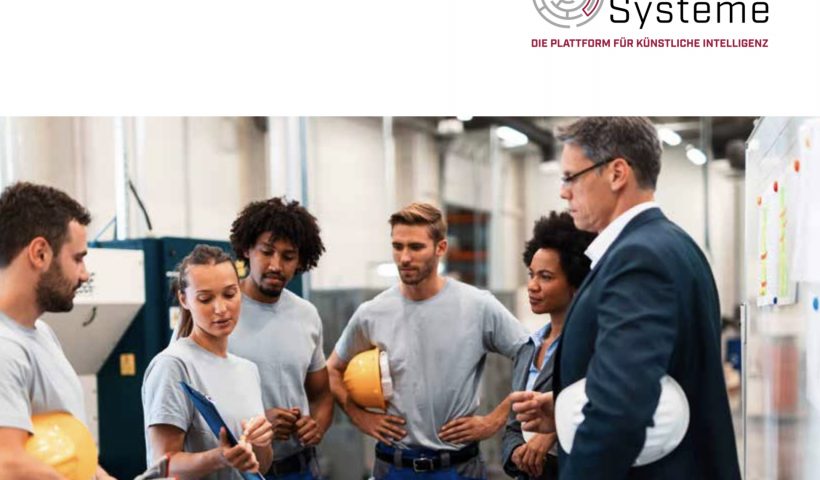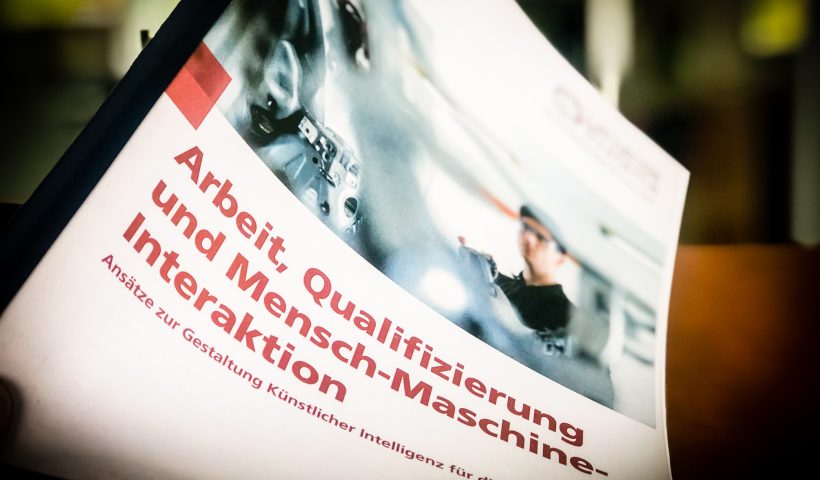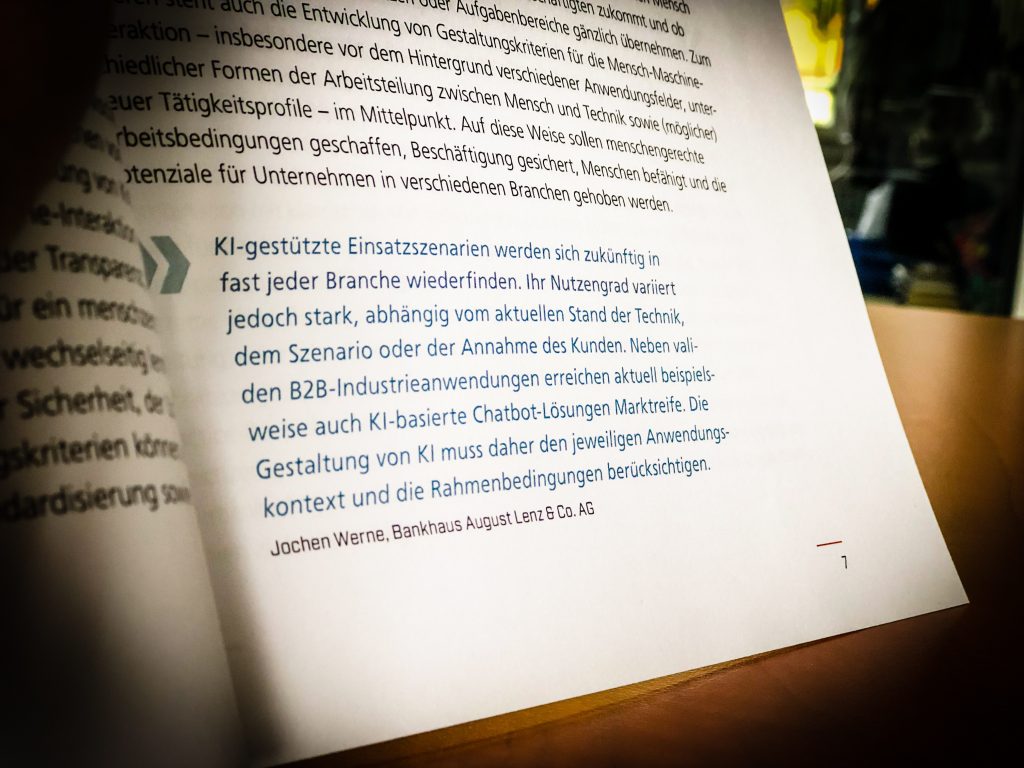Design approaches for change management
About this whitepaper
This paper was prepared by the Work/Qualification, Human-Machine Interaction working group of the Learning Systems Platform. As one of a total of seven working groups, it examines the potentials and challenges arising from the use of artificial intelligence in the world of work and life. The focus is on questions of transformation and the development of humane working conditions. In addition, it focuses on the requirements and options for qualification and lifelong learning as well as starting points for the design of human-machine interaction and the division of labour between man and technology.
Original published in German. Translation made by Deepl.com
Authors:
Prof. Dr.-Ing. Sascha Stowasser, Institut für angewandte Arbeitswissenschaft (ifaa) (Projektleitung)
Oliver Suchy, Deutscher Gewerkschaftsbund (DGB) (Projektleitung)
Dr. Norbert Huchler, Institut für Sozialwissenschaftliche Forschung e. V. (ISF-München) Dr. Nadine Müller, Vereinte Dienstleistungsgewerkschaft (ver.di)
Dr.-Ing. Matthias Peissner, Fraunhofer-Institut für Arbeitswirtschaft und Organisation (IAO) Andrea Stich, Infineon Technologies AG
Dr. Hans-Jörg Vögel, BMW Group
Jochen Werne, Prosegur Cash Services Germany GmbH
Authors with guest status:
Timo Henkelmann, Elabo GmbH
Dr.-Ing. habil. Dipl.-Tech. Math. Thorsten Schindler, ABB AG Corporate Research Center Germany
Maike Scholz, Deutsche Telekom AG
Coordination:
Sebastian Terstegen, Institut für angewandte Arbeitswissenschaft (ifaa) / Dr. Andreas Heindl, Geschäftsstelle der Plattform Lernende Systeme / Alexander Mihatsch, Geschäftsstelle der Plattform Lernende Systeme
The introduction of artificial intelligence (AI) in companies offers opportunities and potential both for employees, for example in the form of relief through AI systems, and for companies, for example in the form of improvements in work processes or the implementation of new business models. At the same time, the challenges in the use of AI systems must – and can – be addressed and possible negative accompanying implications dealt with. The change in the companies can only be mastered together. All in all, it is a matter of shaping a new relationship between people and technology, in which people and AI systems work together productively and the respective strengths are emphasised.
Change management is a decisive factor for the successful introduction of AI systems as well as the human-centred design of AI deployment in companies. Good change management promotes the acceptance of AI systems among employees, so that the potential of new technologies can be used jointly for all those involved, further innovation steps can be facilitated and both employees and their representatives can be made the shapers of technological change.
The participation of employees and their representatives makes a significant contribution to the best possible design of AI systems and the interface between man and machine – especially in terms of efficient, productive work organisation that promotes health and learning. Early and process-oriented participation of employees and co-determination representatives is therefore an important component for the human-centred design and acceptance of AI systems in companies.
The introduction of artificial intelligence has some special features which also have an impact on change management as well as on the participation of employees including the processes of co-determination in the company. The authors of the working group Work/Qualification, Human-Machine-Interaction pursue with this white paper the goal to sensitize for the requirements of change management in Artificial Intelligence and to give orientation for the practical implementation of the introduction of AI systems in the different phases of the change process:
Phase 1 – Objectives and impact assessment: In the change processes for the introduction of AI systems, the objective and purpose of the applications should be defined from the outset with the employees and their representatives and information on the functioning of the AI system should be provided. On this basis, the potential of the AI systems and the possible consequences for the company, the organisation and the employees can then be assessed. A decisive factor for the success of a change process is the involvement of the employees and the mobilisation for the use of new technologies (chapter 2.1).
Phase 2 – Planning and design: In a second step, the design of the AI systems themselves is the main focus. This is primarily concerned with the design of the interface between man and AI system along criteria for the humane and productive implementation of man-machine interaction in the working environment. Of particular importance here are questions of transparency and explainability, of the processing and use of data and of analysis possibilities by AI systems (including employee analysis) as well as the creation of stress profiles and the consideration of employment development (Chapter 2.2).
Phase 3 – Preparation and implementation: The AI systems must also be integrated in a suitable way into existing or new work processes and possibly changed organisational structures. This means preparing employees for new tasks at an early stage and initiating the necessary qualification measures. It is also important to design new task and activity profiles for employees and to adapt the work organisation to a changed relationship between man and machine. A helpful instrument in the introduction of AI systems are pilot projects and expert phases in which experience can be gathered before a comprehensive introduction and possible need for adaptation with regard to AI systems, qualification requirements or work organisation can be identified (Chapter 2.3).
Phase 4 – Evaluation and adaptation: After the introduction of the AI systems, a continuous review and evaluation of the AI deployment should take place in order to ensure possible adaptations with regard to the design of the applications, the organisation of work or the further qualification of the employees. In addition, the regular evaluation of AI deployment can make use of the experience of the employees and initiate further innovation processes – both with regard to the further improvement of (work) processes and with regard to new products and business models – together with the employees as designers of change (Chapter 2.4).
These practice-oriented requirements are aimed at all stakeholders involved in change processes and are intended to provide orientation for the successful introduction of AI systems in companies. In addition, these requirements should also inspire the further development of existing regulations – for example in legislation, social partnership or standardisation – and thus enable an employment-oriented, flexible, self-determined and autonomous work with AI systems and promote the acceptance of AI systems.




